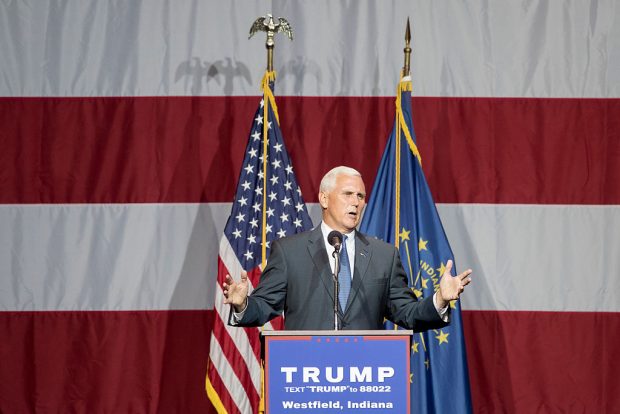In the end Donald Trump’s vice-presidential pick emerged in typical style, blurted out on Twitter. On Thursday night, as the horrors from Nice played out on TV screens, the bombastic billionaire said he was cancelling Friday’s event to unveil his running mate. A rare moment of sensitivity. It didn’t last. Hours later he ended speculation with a Twitter announcement. ‘I am pleased to announce that I have chosen Governor Mike Pence as my Vice Presidential running mate. News conference tomorrow at 11:00am,’ he wrote.
It marked the end of what CNN had clumsily dubbed the VPprentice, with Trump publicly announcing his three final candidates almost as if it were a reality TV show. Chris Christie, governor of New Jersey, and Newt Gingrich, former Speaker of the House, were the two runners-up.
Here’s why Pence won through.
Firstly, he brings the base. Pence is known to describe himself as ‘a Christian, a conservative and a Republican, in that order’. He will reassure a swath of the party have watched in horror as Trump tied himself up in knots discussing abortion – suggesting women should be prosecuted for having illegal terminations – and cringed at his embarrassing slips in church (trying to place a donation on the Communion plate, for example). Trump may not be a traditional Republican but his running mate has the credentials to satisfy the conservative base.
Secondly, he brings experience. He is not just a proper Republican but a proper politician. One of Trump’s biggest weaknesses is that he lacks political experience. Pence, in contrast, knows his way around the House of Representatives (where he represented Indiana’s sixth Congressional district from 2001 to 2013) and has been governor of Indiana since 2013.
Thirdly, he brings old, white, male voters. And in so doing 57-year-old Pence gives us some clues about how Trump will try to win over wavering Democrats. A poll last week showed the presumptive Republican nominee winning precisely zero black voters in the two key battlegrounds of Ohio and Pennsylvania. His VP pick – from a big Irish Catholic family – tells us Trump doesn’t care. He could have gone ethnic or female, making up ground lost to Hillary Clinton, but has instead sought to bolster his key demographic of older, white men. His gamble is that there are enough disgruntled blue collar Democrats, angered by Clinton’s Wall Street ties, to make the difference.
Fourth, he brings ties to the Koch brothers. Charles Koch and David Koch are the biggest GOP donors out there. And it is no secret that they are allies of Pence. They backed his Indiana campaign, his staff have spent time working for them, and the state is seen as something of a test bed for their conservative ideas. Up till know they have resolutely refused to back Trump, who has repaid the favour by condemning the role of big donors throughout the primary campaign. However, he will need more money to fight Clinton’s massive general election effort and teaming up with Pence raises the idea that he might finally by trying to woo some big money backers.
And finally, he brings scrutiny of Trump’s policy platform. He might almost be the anti-Trump – coming as he does from modest means, with a slick political manner and scepticism of some of Trump’s boldest policy pronouncements. He has been critical of the presumptive nominee’s plan to ban Muslims from entering the US, for example, pointing out that the constitution guarantees freedom of worship while at the same time opposing attempts to settle Syrian refugees in his state. He also takes a different stand on free trade, backing the North American Free Trade Agreement that Trump blames for so many of America’s problems.
The key to all of this is that the running mate never wins the election. But they can certainly lose it. Trump, once again, has proved himself a canny enough operator with enough self-awareness to understand how this works. He has enough showbiz. Now he has added a safe pair of hands to his ticket.






Comments